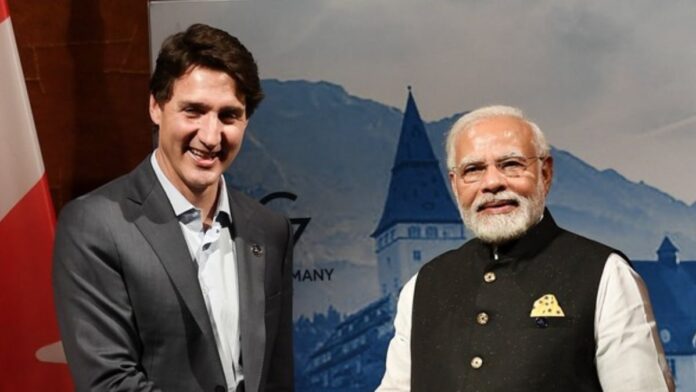India-Canada Diplomatic Crisis: Escalating Tensions Over Khalistani Leader’s Assassination and Expulsion of Diplomats
India and Canada have recently been caught in a deepening diplomatic standoff, a situation that escalated significantly on Monday when India expelled six Canadian diplomats. This decision followed Ottawa’s designation of India’s ambassador and other Indian diplomats as “persons of interest” in an ongoing investigation into the killing of Hardeep Singh Nijjar, a pro-Khalistani terrorist, on Canadian soil. India responded to this move with strong words, calling Canada’s actions “preposterous” and accusing the Justin Trudeau government of political maneuvering. In a tit-for-tat exchange, both nations have expelled each other’s diplomats, further straining ties between the two countries.
Canada, on its part, has asked six Indian diplomats to leave the country, alleging that Indian officials were involved in activities detrimental to Canadian sovereignty. Prime Minister Trudeau made strong accusations, claiming that Indian diplomats were collecting information on Canadian citizens and passing it to organized crime groups, which were then allegedly involved in violent actions against Canadians. Trudeau also alleged that the Indian government was responsible for targeting and killing Canadian citizens on its own soil, specifically in reference to Nijjar’s assassination. “India has made a monumental mistake,” Trudeau said, in a move that has further fueled the controversy.
India has firmly denied these accusations, branding them as absurd and an extension of political gamesmanship by the Canadian government. The diplomatic feud is rooted in long-standing tensions between the two nations, exacerbated by allegations linking Indian agents to the assassination of Hardeep Singh Nijjar, a Sikh separatist leader in British Columbia.
Relations between India and Canada took a significant downturn last year, following Trudeau’s public remarks that he had credible evidence linking Indian government agents to Nijjar’s killing. The Royal Canadian Mounted Police (RCMP) has backed these claims, stating that they had uncovered information on broad criminal activities allegedly orchestrated by agents of the Indian government, targeting members of the South Asian community in Canada.
The assassination of Nijjar on June 18, 2023, outside a Sikh temple in British Columbia, marked a critical juncture in India-Canada relations. Nijjar, designated as a terrorist by India in 2020 for his involvement in the Khalistani separatist movement, was shot dead by masked gunmen. The Canadian government viewed this killing as an unacceptable violation of its sovereignty, and soon after, relations between the two countries began to unravel.
In the months following the assassination, several key events further strained diplomatic ties. In September 2023, Canada announced the suspension of trade talks with India, a surprising move given that the two nations had been negotiating a trade deal. Shortly after, during the G20 summit in New Delhi, Prime Minister Modi expressed his concerns to Trudeau about ongoing Sikh separatist protests in Canada. This exchange did little to ease tensions.
On September 18, 2023, Trudeau raised the stakes by publicly stating that Canadian security agencies were actively investigating the involvement of Indian agents in Nijjar’s murder. India dismissed the accusations as baseless, and both countries responded by expelling each other’s diplomats. The diplomatic retaliation did not stop there. A few days later, India suspended issuing new visas for Canadians, only resuming them two months later, highlighting the deteriorating relationship.
As the diplomatic rift widened, further developments occurred. In October 2023, Canada withdrew 41 diplomats from India, citing the growing dispute. At the same time, in Surrey, British Columbia, tens of thousands of Sikhs participated in an unofficial referendum on the creation of an independent Sikh state, Khalistan, outside the same gurdwara where Nijjar was killed.
The situation took a more serious turn in November 2023 when India’s National Investigation Agency (NIA) filed a case against Gurpatwant Singh Pannun, a prominent Sikh separatist figure, for allegedly threatening Air India passengers in video messages. This case was followed by reports from the US, where American authorities claimed to have foiled a plot to kill Pannun, further escalating concerns over Indian involvement in international affairs related to the pro-Khalistani movement.
In early 2024, tensions continued to simmer, with the White House describing as serious the allegations that an Indian intelligence officer was directly involved in Nijjar’s killing and the failed plot to assassinate Pannun. India has repeatedly denied these claims, insisting that the reports were based on “unwarranted and unsubstantiated imputations.”
Canadian police investigations into Nijjar’s murder have resulted in charges against three individuals allegedly linked to the killing. Moreover, in August 2024, Canadian authorities warned Pannun of an increased threat to his life, further fueling concerns over Indian involvement in targeting Sikh separatists abroad.
The current situation remains highly volatile, with both countries entrenching their positions. The RCMP has accused Indian agents of orchestrating violent activities targeting the South Asian community in Canada, specifically members of the pro-Khalistan movement. Canada’s law enforcement agencies claim to have successfully disrupted several plots and charged individuals involved in homicides and other violent acts.
India, on the other hand, has rejected these allegations outright. The expulsion of diplomats, the suspension of trade talks, and the diplomatic sniping between Trudeau and Modi signal a deep and potentially lasting rift between the two nations. Both sides remain far from a resolution, with tensions likely to persist as investigations into Nijjar’s killing continue. The future of India-Canada relations now hangs in the balance, shaped by allegations, denials, and a growing diplomatic crisis.

